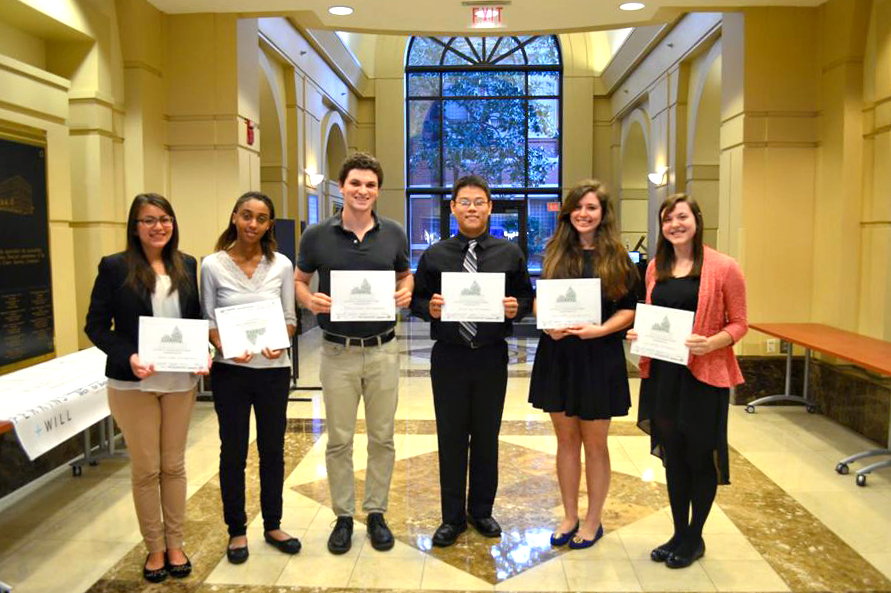While many schools across the nation have several greenhouses used for growing produce and learning, Tech has only one small greenhouse, powered by a hydroponic drip-irrigation system on top of the Cherry Emerson Building that few students have access to. Georgia Tech’s organization, Engineers for a Sustainable World (ESW), specifically the Hydroponics Team, has been working to change this.
Their mission is to create a sustainable greenhouse on the Georgia Tech campus for not only research, but for service and education as well. The team uses a method called hydroponics to grow produce.
Hydroponics is a soil free method of farming, allowing for a more direct flow of nutrients to the plants. It requires 90 percent less water than traditional soil-farming and increases crop production while shortening the crop cycle.
The project started in the summer of 2014 with the President of ESW and the Hydroponics Team’s co-leader, Nicole Kennard, third-year MSE. She reached out to a nonprofit organization called SEEDS Global that works to educate students about sustainability and healthy eating. Her first project in conjunction with SEEDS Global was the installation of hydroponic systems at Perkerson Elementary School in Atlanta. Shortly after, Kennard decided to bring hydroponics to Tech. Kennard and recent Tech graduate, Jeffrey Landau, ‘15, ME, worked together on a proposal to build a hydroponic greenhouse on campus.
“We had this proposal approved by Dr. Terry Snell, Chair of the School of Biology, as well as Dr. Gary May, Dean of COE,” said Kennard. “After presenting this project to Capital Space and Planning, we received must support by Steven Swant, the Executive VP for Administration and Finance. However, even though we had identified several places where this high-tech, completely sustainable greenhouse could be built on campus, we lacked major funding. Then, after recruiting a project group that Fall, we started working on getting our proposal plans more specific as well as starting our research.”
Since then, the Hydroponics Team has taken on various challenges to develop and advance their project.
“Last March, we participated in the Greenovation challenge to redesign a more sustainable student center and won with our plans for a combination hydroponics/study room,” said Jamie Curtis, second-year MSE, and co-leader of the Hydroponics Project. “Our plan is to create a large on-campus greenhouse from which produce will be donated to the community and which we will use to optimize hydroponics systems so they are more cost-effective and can be used by a larger percentage of the population.”
In their current greenhouse on the Cherry Emerson building, the Hydroponics Team was able to donate a large portion of lettuce produce last year to the Atlanta Food Bank. However, the team wanted to go bigger.
Unfortunately, the Hydroponics Team lacks the funding necessary to realize their dream of creating a completely sustainable greenhouse on campus — which is where the Ford College Community Challenge comes into play.
This competition, sponsored by the Ford Motor Company, may be the key to allowing the team to implement their community-building project.
The theme for this year’s competition is “Building Sustainable Communities.” Ten of the twenty finalist organizations will receive a $25,000 grant to see their projects come to reality. “Our main mission as outlined in the grant, should we receive it, would be to construct this high tech, solar powered green house and then have our Hydroponics Team, comprised of about ten students, research, create, and then optimize hydroponic growing methods for use in urban food deserts,” Kennard, said.
Previous winners include Kettering University’s community aquaponics system that combines hydroponics and aquaculture, which involves farming aquatic organisms, Brown University’s Rainwater Harvesting System for developing countries and Purdue University’s urban water project in their local community.
If the Hydroponics Team receives the grant from the Ford Competition, the team will have enough funds necessary to design and construct a larger greenhouse on campus. “Our vision is that this greenhouse will become a laboratory for sustainable urban agriculture, including hydroponics, aquaponic, aeroponic methods. This will be a place for students interested in creating and optimizing these systems to learn and optimize them, as well as to construct completely new systems and test them. We are also speaking with many professors in hopes to have certain classes and lectures held there for hands-on learning in a green space. We will also have the area open to GT tours and students from elementary and high schools to tour our greenhouse and learn about sustainability,” Kennard said.
The Hydroponics Team expects to hear back from the Ford College Community Challenge this September.
Correction: An earlier version of this article misstated the name of a Tech graduate. His name is Jeffrey Landau, not Jerry.
